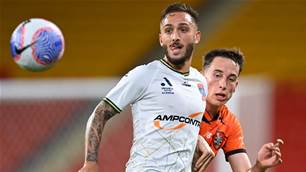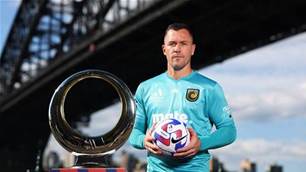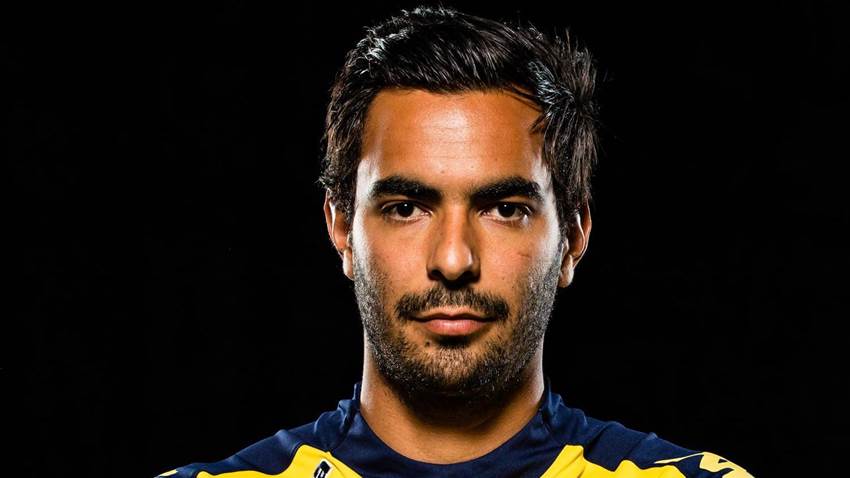EXCLUSIVE: Imagine trying to coach 109 young offenders with just two footballs? In a prison? In Madagascar? And you don’t speak the local lingo.
Or turning up to train with your top league club and you have to get changed in public next to where you train because the club doesn’t have changing rooms or prehab facilities.
Or worst of all, trying to cope with a sudden family tragedy?
These are just some of the challenges Argentine playmaker, budding documentary maker and former Johnny Warren Medal winner with Adelaide United Marcos Flores has endured during a rollercoaster few years since we last saw him in the A-League.
Now back in Argentina with his family and Russian girlfriend, the 33-year-old ex-Reds, Melbourne Victory, Mariners, and Jets star says he is in a “transition” period.
He is training on his own and keeping his options open after a successful stint with Bali United in 2017 - though Australia is always in his heart.
Flores: A-League turned me into a 'true soccer player'
Marcos, sum up your 2018…
I’m okay, Aido.
I’m in a transitional stage in my life after a tough period in the latter stages of my professional career.
I was 32 years of age when I came back home to Argentina.
Unfortunately, while everything at Bali United in 2017 was good on the pitch with nine goals and 10 assists and they asked me to re-sign, then I came back home on holidays and my father passed away.
He passed away with a heart attack.
That was a really really big punch in my life.
My dad was a true friend of mine and was the most loyal supporter of me in my life. And obviously, I needed to decline a few club options that I had in Indonesia and India around this time.
I decided that my obligations to my family were bigger than my football career.
So 2018 was full of recovery for me emotionally and on the fitness side. I couldn't join any team during this time. I trained by myself but it's not the same as training with your club.
I flew to Russia and I joined a team over there in the 4th division. They kindly accepted me to train and play in a little tournament.
And then I flew to Africa.
Africa?
Yes, I want to help kids around the world so I went to Africa. Teaching them and training them. Playing in the street with them. I wanted to feel the deepness of Africa.
I did this because I wanted to grow up as a person. And I wanted to impart my football methods because I would love to one day teach.
I wanted to see and I wanted to learn how these African kids have this passion and love for the game while having nothing.
Visiting schools in Madagascar 🇲🇬 running some little sessions - 4 classes from 10 am to 16 pm!⚽️❤️ Alongside @PlaymakersPTA 👏🏾 pic.twitter.com/ARDypkNlXE
— Marcos Flores (@MarcosFlores85) 29 August 2018
Their fields are 10 times worse than Australia. And they have much less than any single Academy in Australia.
But they love the game and they love to smile as they play the game.
I went to Greece and Russia plus Egypt, Tanzania, Kenya, Madagascar, and South Africa. This was not supported by any sponsors or any football associations, I didn't ask anyone.
I just packed my things put the soccer ball in my bag and tried to achieve the dreams that I had when I was a young kid growing up in Argentina.
Awesome journey traveling around the world alongside #PTA.FOOTBALL ⚽️ playing football in the streets 👬🇵🇸🇮🇱🇷🇺🇬🇷 #herewego #keeprolling pic.twitter.com/VSMy7juVh5
— Marcos Flores (@MarcosFlores85) 22 July 2018
I went to underprivileged areas and the slums of Africa such as Soweto, and the message that I wanted to pass on is the dreams can come true.
You don't need much you only need the desire and love for the game and belief that it is possible.
Obviously, these kids don't have the facilities or in some cases not even a ball, but mate, they play with a smile! It's inspiring.
The footage that we shot is now being edited and I will try to put this into some form of documentary.
We have some great stories… we ended up in a jail in Madagascar called Antanimora in Antananarivo, training and coaching 109 kids who were inmates with only two footballs. Two footballs! In one futsal field inside a prison.
What did you learn from this trip?
I learnt that a soccer ball does not understand religion.
I learnt that the soccer ball does not understand about passports.
I learnt that a soccer ball doesn't understand about races.
I learnt that coaches' greater responsibility beyond just coaching football. I was teaching languages with the sessions in that prison, teaching them English and Spanish for example.
I learnt so much.

It was such a worthwhile thing to do that investment of traveling for four months and the adventure of being on a motorbike for 2500 km with another guy going through national parks in Africa.
I never thought I would be in a prison asking the guards to throw a ball to the prisoners. I never thought I would do that.
I was speaking in English and they were translating into Madagascar's language and French. And we were able to do the session.
If you believe in something, with passion and enthusiasm, you can do it. You can put on a session for 109 players with just a couple of footballs.
So will this footage be seen in the future?
I don't know when it will be released, I have the footage and the guy who traveled with me is in Shanghai.
I need somebody who can translate things into English…
I want to make it clear that this is not something that I want to do to become famous for. That's not my motivation; I don't want it to be something on Netflix!
I just really wanted to have it to show coaches at conferences and where people need a motivational speaker; I want to have footage to show the parents.
So the motivation is not necessarily to put it in cinemas or on Netflix.
I just wanted to share and inspire others. To create a new way of seeing things. My style is to genuinely help the game of football in any way I can.
Back to your time in the A-League, your move to Melbourne Victory. How do you reflect on that five years later?
Their facilities are world-class and I did not have any injury there during that season. I embraced their professionalism.
Let me tell you, Melbourne Victory is as professional as some of the clubs in Europe. It is world class.
Melbourne Victory for me was an experience at being at a big club.

(However) I was not played at Melbourne Victory in the right position, everyone knew this.
I was never a false 9. It was the only year Melbourne Victory try to play with a false 9, and it was not my position.
And it was not a system that fits Melbourne Victory. I was unlucky to be in that formation.
But I scored the goal of the year for 2012, which was a nice combination with Gui Finkler. It was unlucky that Finkler got injured because together we were creating some opportunities for Marco Rojas and Archie Thompson.
I lost the perfect fit to play Tiki Taka when Finkler got injured.
I was told when they signed me that we were going to have a number 9, but when Danny Allsopp retired Ange had a 4-2-2-2 formation with two number tens and two wingers.
So for me, it was frustrating because I couldn't enjoy playing football that's why I decided to go to Central Coast Mariners - everyone takes this move as a failure at Victory, though in four games I scored as many goals at Central Coast as I did at Melbourne Victory.
Actually I was more ready to perform at Victory than I was at Adelaide because of my age, I was 26 years old at Melbourne Victory and you can say I was in my prime then.
But after five games at Central Coast, coach Arnie moved to Japan and ever since then the club has been struggling.
Newcastle Jets signed you as an injured player in your last stint in the A-League…
I will never forget the club because when I did my ACL and Central Coast Mariners decided to not extend my contract; the Jets sign me with four to five months ahead of rehab.
You cannot add any more, that says it all. I will be forever thankful to the club, sadly there were a lot of problems at the club with the squad and the ownership situation during this time.
You also had a stint after the A-League in the US second division with Jacksonville Armada…
They approached me about a project. To build a club from scratch. It was a good challenge but things didn't go well with the team, we didn't do well.
And many of the fields weren't great and it was my first year back from being injured so I had a little bit of fear.
But overall I learnt a lot even though after a year I regretted it and felt that I dropped a level coming from the A-League. The A-League was much better than the US Second Division.
In 2017, you ended up with Bali United. Tell me more!
My Indonesian journey was crazy.
First I joined a club called Persib Bandung in 2016. They were the Melbourne Victory of Indonesia.
I joined them because my former teammate at Adelaide United Sergio van Dijk was there.
I love playing with Sergio and we went from 12th position in the league to fourth - then one of the owners offered me to join his side at Bali United.
For lifestyle, everyone is desperate the play for Bali, but for me, I've always been competitive and had a purpose in my football career.
I didn't want to finish the middle of the table, I was always competitive. I didn't want to be at the beach and have a great lifestyle but lose every single game.
The facilities in Indonesia are really strange, and Bali United is considered to have one of the best facilities! Yet incredibly we did not have a locker room!
BALI UNITED ON THIS DAY!!!
— Bali United FC (@BaliUtd) 30 April 2018
.
Tepat 1 tahun lalu, Bali United berhasil mencatatkan kemenangan away pertama atas Persela Lamongan di Surajaya. @MarcosFlores85 mencetak satu-satunya gol di pertandingan tersebut lewat titik penalti. pic.twitter.com/YL0YKweeov
Tell me about training...
We were training at 7:30 in the morning, I would get there at 6:30-45 start my prehab and no one was there.
We had no place to change we would arrive on a motorbike and a team manager would give us our training gear and we were getting changed on the side of the pitch in front of anyone passing by, it was like a public area.
No locker room meant no showers.
We would start at 7:30 but sometimes some players would still be asleep, so maybe you need to wait till 7:45.
So you arrived with your swimming shorts on and singlets and get changed on the side of the pitch.
At the end of the session you give the team manager your sweaty training gear, you put your swimming shorts and singlet back on and back to your home on your motorbike through the crazy traffic
So you ride on the sidewalks, you drive with no rules at all there!
Prehab did not exist at Bali United. I became the teacher of prehab at Bali United.
So that is why I was so thankful for Australia because I learnt so much of my prehab there. So I took the elastics and the rollers with me. I was giving elastic to my teammates so they could do their own prehab and teaching them about the benefits.
When I came back to Argentina after my father passed away, I rejected a new contract.
Who were the greatest players you played against and with?
Juan Roman Riquelme. I was on the bench in Argentina during a club match as an 18-year-old when Newell’s Old Boys played his Boca Juniors. What a player.
In Australia Alex Del Piero was amazing and I always liked Luke Brattan even as a youngster in Brisbane. He was really talented.

And Matt Leckie, I played with him and this kid always surprised me. I remember against Gold Coast we lost at home in Adelaide and after 20 minutes he did his hamstring. Yet he played for 120 minutes. I realised he had the right mentality. He was earning less but he was working his arse off. I told him to keep working hard. Travis Dodd had such power too.
But Shinji Ono I remember. I used to love him and I also loved Thomas Broich. Rogic and Mooy were also pretty special during my time in the A-League.
And watching from a distance, Ninkovic I admire.
What does 2019 hold?
I want to join a club, one that believes in me. One where I can give football wise and give in the youth development.
If that doesn't happen then I will keep travelling around the world and keep growing until I find a house in the planet or a city in the planet that I will call my home and to build a Football Academy. It could be in Argentina it could be in Australia could be in the USA. You never know what will happen in the future.
I'm open and I'm ready to go.
I'm hoping one day I can open my Football Academy or I can work for a club in development and build my career as a head coach.
Maybe I can play one more year maybe I can play two more years, I'm 33 now.
Obviously, I had a year where I lost somebody really important but I believe I'm capable to play a little bit more but I won't just play the cycle of being a professional footballer. I want to feel like I'm helping…
Related Articles

Victory poised to pick up Jets discard Piscopo

Mariners to embrace grand final home comforts: Vukovic
.jpeg&h=172&w=306&c=1&s=1)












